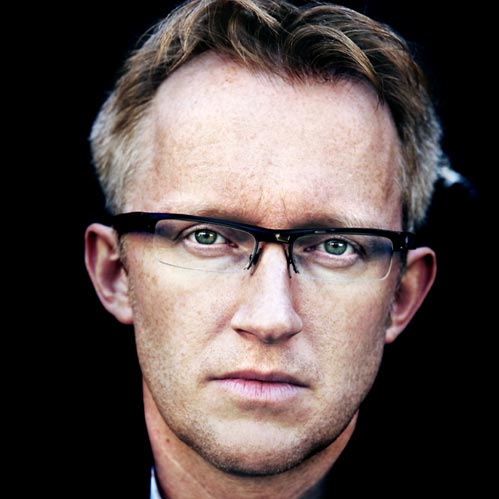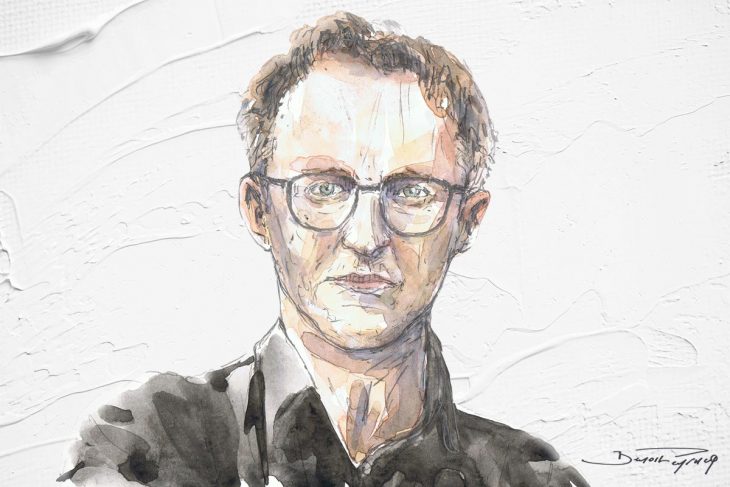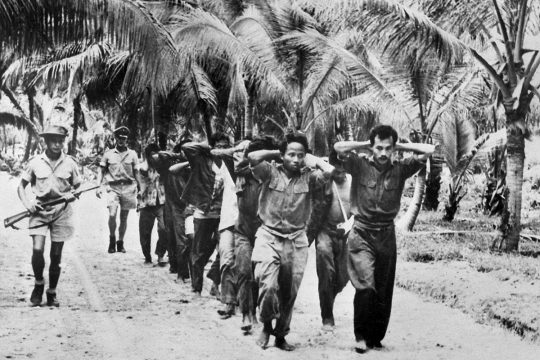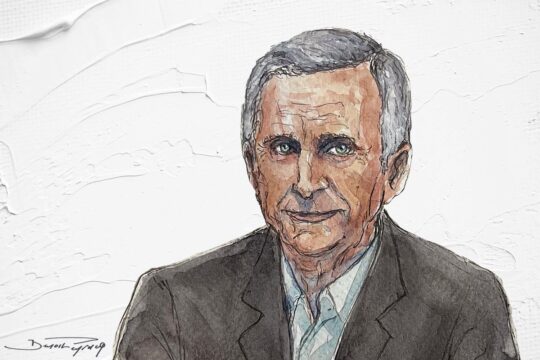JUSTICE INFO IN-DEPTH INTERVIEWS
David Van Reybrouck
Historian and author
Belgian essayist, historian and journalist David Van Reybrouck has taken a close look at Belgian and Dutch colonialism in two major works: “Congo, a history”, and “Revolusi, Indonesia and the birth of the modern world”. He talks about the recent increase in Western awareness of colonial violence, and describes its symbolic limits. In his view, "we struggle against the symbols of past injustices while accepting the structures of present injustices”.
JUSTICE INFO: What do Belgium and the Netherlands have in common regarding colonization, and what distinguishes them?
DAVID VAN REYBROUCK: In colonizing the Congo, King Leopold II was directly inspired by the Dutch kings William I and II, especially with regard to the role of local aristocracies. Colonizing was a costly affair, so the most effective way was to rely on the local elites, making agreements with them. In the Dutch East Indies (now Indonesia), this led to excesses by the Javanese aristocracy. Indeed, in the early 19th century, the Netherlands brought a number of crops: coffee, indigo, quinine. The people had to provide these crops. The local aristocracy received bonuses when the crops were good. The bonus was such that it led to exactions.
In both cases, it was colonialism stemming from capitalism, in other words exploitation was the basis of the enterprise. But there is a great distinction between the two. In the case of the Dutch occupied Indies, it was agricultural exploitation. In the Congo of Leopold II, it was industrial and mining colonization. It began with rubber and then extended to copper, with the consequence in the Belgian Congo that exploitation was concentrated in the south, in the Katanga region. Dutch colonization extended over the whole territory. In that case, there was a clearer colonial presence over a larger territory, very much focused on agriculture.
In terms of violence, the Belgians were worse in colonization and the Dutch in decolonization. In Indonesia, from the middle of the 19th century, there were vaccination campaigns; from 1900, there was education for Indonesians; from 1910, there was a first generation of doctors trained by the Dutch. In the Belgian Congo, in 1960 there were only 16 or 17 graduates. Until the 1950s, physical punishment was still de rigueur. In the Dutch Indies, the colonists were under the illusion that the Javanese people were gentle. There were a few "bad apples", inspired by Islam, nationalism and Marxism. These troublesome personalities were physically removed to an internment camp in Papua, in the bush. The vast majority of Dutch people are completely unaware of the existence of this veritable gulag, in which the prisoners had to build their own penal residence and live there under very difficult conditions.
British researchers sought to find out which country was the most proud of its colonial past. To their surprise, the Netherlands won the contest.
Today, is the relationship to this colonial past different in "small countries" like Belgium and the Netherlands compared with France or Great Britain?
For You Gov [polling and market research company], British researchers sought to find out which country was the most proud of its colonial past. To their surprise, the Netherlands won the contest, and by far. In 2019, 50% of Dutch people said they were proud of the colonial past; 26% hoped for a new overseas project; and only 6% had a negative view. This is incredible. It shows how much the memory of the colonial past has been reduced in the Netherlands. The national discourse, the memory, was dictated by the 120,000 veterans, the 300,000 colonists, the Indo-Europeans who returned. The national discourse was formed by those who were forced to leave - in total, 450,000 people. As with Algeria and France, there was the equivalent of the Harkis, people who came from the Moluccas, conscripted into the colonial army. On the other hand, very few Indonesians settled in the Netherlands after Indonesia's independence. In addition, the hours of history teaching have been reduced in high school studies. This really leads to a blindness, a historical illiteracy.
Things have changed recently...
Absolutely. The last few years have seen a colossal acceleration in the Dutch collective memory. Several factors have contributed to this: the condemnation of the State by the courts, the studies of Swiss-Dutch historian Rémy Limpach, the apology of the King in 2020 and that of the Prime Minister in 2022, and finally the recent report "Independence, decolonization, violence and war in Indonesia 1945-1950" - dates of the end of the colonial period in Indonesia.
This very large report condemns what happened. Certainly, the fact that this research avoids the term war crime has been criticized as a weakness. On the contrary, in my opinion, the use of "extreme violence" allows for a broader definition not to be limited to the definition of war crimes at the time. It has been established that this was systemic violence, that it was in the military structures that this form of violence was used, with the full knowledge of the military and political authorities.
Until a few years ago, around 2013-2014, there was only a small room called "The Netherlands Overseas" out of 60 exhibition rooms at the Rijksmuseum in Amsterdam. I feel that this is a bit inadequate for a country that has been active for three centuries on three continents. Since then, the museum has done an exhibition on the Indonesian revolution. And the collections have been reorganized. We are really seeing a major acceleration in the way we deal with the colonial past.
I can assure you that I have seen first-hand, for the first time in my life, how a collective memory can evolve. Along with my book, there have also been documentaries broadcast as well as a theatrical tour on the subject. I spoke in front of about 25,000 people. In the room, there were remarks such as "Why didn't we know?", and "I am ashamed, what should I do about it?”
There is a big difference between the situation in the Netherlands and in Belgium. In Belgium, there are many Congolese, Burundians and Rwandans, more than there are Indonesians in the Netherlands.
Are both sides of the story being told?
In Belgium, at this very moment, the Congo Commission is meeting in Parliament. In the preparatory work, there have been historians, people from the diaspora, from both sides. There is a real willingness to listen and to exchange. This is absolutely essential.
There is a big difference between the situation in the Netherlands and in Belgium. In Belgium, there are many Congolese, Burundians and Rwandans, more than there are Indonesians in the Netherlands. Congolese, Burundians and Rwandans arrived after the genocide [in Rwanda] in 1994. They are the children of the genocide. They are in their 20s and 30s and are some of the biggest activists. They live the reality of urban or suburban life in a post-colonial Belgium where discrimination is still present. So this both sides discussion has taken place. The preparatory work for the Congo Commission was interesting, rich and nourishing. The Parliament is now talking about it.
And in the Netherlands?
There is a big difference. In the Netherlands, the King and the Prime Minister apologized in 2020 and 2022 respectively for the violence committed during decolonization in Indonesia in 1945-1949. Nothing was said about the 350 years before that, while the Belgian king expressed his deepest regret about the entire colonial era, including the time of his great-great-uncle Leopold II. The Netherlands has taken an important step, but let's not think that everything was smooth sailing before the war of independence began in 1945. There was violence for 350 years. So the difference between the two countries is very clear.
In the Netherlands, do we hear the stories from Indonesia?
We are making an effort. In the exhibition at the Rijkmuseum, two of the curators were Indonesians. But they were criticized. One of them published a "carte blanche", an opinion piece in NRC, the leading Dutch newspaper. I see that Indonesians are given a voice as long as they say what we want to hear from them.
A parallel can be drawn with the debate about what happened at the Documenta [contemporary art exhibition that takes place every five years in Germany] this year, where there were Indonesian curators. When I was in Germany to promote my book, I was constantly asked why there was so much anti-Semitism in Indonesia. I think there are more anti-Semites in Germany than in Indonesia, but Documenta was accused of being anti-Semitic. I went there, I met the Indonesian curators, young and old, open to the world. I think that the Documenta they made is the most important in the history of this event. For the first time, a collective from the South was given the floor. This Indonesian collective opened the programme by inviting artists from the South. In both cases, at the Rijksmuseum and at the Documenta, I notice that the point of view of the Indonesians was not taken into account.
We invite people from the other side of the world while thinking that they have a framework of thought, historical and moral references identical to ours. And as soon as they make a faux-pas against the European moral perceptions, they are disqualified.
So we are not ready to listen to these voices?
This is the beginning of a dialogue that should be global, and it is difficult as it creates tensions. There are European sensitivities that have not been well perceived. Sensitivity about what happened to the Indo-Dutch [targets of abuse by the Indonesians during the War of Independence] and anti-Semitism. In fact, we invite people from the other side of the world while thinking that they have a framework of thought, historical and moral references identical to ours. And as soon as they make a faux-pas against the European moral perceptions, they are disqualified.
That said, in the historical research conducted by the Royal Netherlands Institute for Southeast Asian and Caribbean Studies (KITLV), the Netherlands Institute for Military History and the Institute for War, Holocaust and Genocide Studies (NIOD) on the War of Independence in the Netherlands, Indonesian historians have had a less controversial role. This is probably because science works differently from the art world.
You say you were surprised by the attitude of young Indonesians, who are indifferent to the colonial past. This makes them different from young Congolese. Why do populations affected by colonization react differently?
Indonesia is doing better than the Congo. Indonesia is an emerging economy; the Congo is a failed state. In Indonesia, the past is very much in the past, and it is used in a more playful way - for example, cafes where hipsters use references to the colonial past. Even the colonial spelling is reused. But I am increasingly wondering if it will stay that way, especially with the brutal way global warming is going to be felt. Jakarta, the Indonesian capital, is partly flooded. Will the colonial reference remain playful? In my opinion, there would be fertile ground to plant an anti-colonial discourse. If your crop is not like it used to be, if drought hits your family, if your house is flooded, it is the fault of the Westerners. They have exploited us in the past, they are still exploiting us.
The report of the Belgian commission on the colonial past advocates payment of reparations. What do you think about this? How do you think this past can be repaired?
Belgium could recognize the suffering that took place, the discrimination and the effects of racism from which "Afropeans" still suffer, to use the expression popularized by the novelist Léonora Miano. The word recognition seems to me to be essential here. The report of the Belgian experts came up with a whole series of interesting forms of reparation: the restitution of objects, which is fully underway - even if some objects will perhaps remain in Belgium, their property will be Congolese - or the creation of a House for Congolese culture in Brussels. In my opinion, this is a legitimate demand.
We work so much on historical colonialism that we tend to forget the colonization of the present and the future.
What would such a place allow in terms of reparations for the colonial past?
In the diaspora, there is a lot of creativity and energy. It would allow for the professional structuring of this artistic milieu with the means of the State. The State would subsidize. One speaks thus about a real recognition. At the same time, I know that there is a whole discussion on the monuments, the street names. This point is important, but what strikes me is that we work so much on historical colonialism that we tend to forget the colonization of the present and the future. And a Belgian mayor who has removed all the problematic statues and changed the street names, who has adapted the school books but has done nothing against global warming as his municipality continues to use fossil energy, such a mayor has done less against colonialism than one who ensures his municipality will be heated with renewable energy by 2040. In Brussels, the hottest parts of the city are the poorest parts, where the migrants live. The parts where the air is most polluted are the districts where the descendants of people from the former colonies live. You can change a statue or a street name somewhere in a nice residential area, but it won't change anything in relation to this so-called rotten neighbourhood.
I don't quite understand how the fight for decolonization can be separated from the fight against global warming. Focusing only on historical colonialism without seeing the future seems to me problematic. We are fighting against the symbols of past injustices while accepting the structures of present injustices! We can imagine a Belgium where all the names of streets and squares have be cleaned up but where a young dentist has difficulty finding a place in a practice because she is of Congolese origin, where a family has difficulty finding a place to live because they are of African descent. What is the point of having good school books that respect African history if, at the same time, a Burundian family cannot find suitable housing?
Is the restitution of objects also symbolic?
It is not for me to say. It is up to the Beninese, Congolese, Burundians to say "yes, indeed this belongs to us". Let's not be paternalistic. Let's not say: you have to take these objects back. It is not for us to say that, when most Congolese are in an economy of survival. They don't have the luxury of dealing with masks stolen at the end of the 19th century. That's not to say that we shouldn't look at this kind of challenge - I think it's important that a young Congolese person has the chance to see in their own capital city artistic and cultural objects that are important to their culture. That seems good to me. But I say if that's all you do, you miss the point.
It was a Dutch judge who opened the eyes of the Dutch.
What role can the judiciary play in the recognition of colonial facts?
It was a Dutch judge who opened the eyes of the Dutch. The judge condemned the state to compensate the widows of the Rawagede massacre in December 1947 [431 men killed by Dutch soldiers on the island of Java]. You can see the gigantic importance of this legal work. At the same time, I found it strange that elderly people had to take action in court. Should the descendants of all the victims of the Dutch atrocities go to court? At some point, I think the Dutch state should show some recognition, that all those who can prove their family connection to those who died in the systemic violence are important. Perhaps there should be some form of general justice that prevents older people from having to go to court.
Acknowledging the wrongs of the past is essential, of course. But let us beware of excuses, because they maintain the circle of revenge.
What do you think about calling colonization a crime against humanity, as French President Emmanuel Macron did in 2017 in Algeria?
Of course, Macron is right when he talks about colonization as a crime against humanity.
It's obvious that the past still hurts. It is obvious that the colonial wound has not healed and that every form of reparation, of reconciliation that can unite humanity is important, because in the face of today's challenges, we will have to resolve our differences. We will need to fight global warming together. We will need to fight shoulder to shoulder.
Acknowledging the wrongs of the past is essential, of course. Colonialism, even in its most humanistic form, has always been exploitation. This is the hard core of colonialism. The colonialism of the 19th and 20th centuries is a consequence of the global capitalism led by the West since the 15th century.
But let us beware of excuses, because they maintain the circle of revenge. There is always a winner and a loser. The American Marshall Rosenberg, creator in the 1960s of non-violent communication, says it clearly: asking for an apology changes the hierarchy but keeps the spirit of revenge. It is not a true reparation, not a true reconciliation. On the other hand, I think that the work of Desmond Tutu in South Africa, with the Truth and Reconciliation Commission, has been extremely important. In this sense, I am very happy that the Congo Commission in the Belgian Parliament is not only working on truth but on reconciliation. The term reconciliation is important and reconciliation can take many forms. There are several mechanisms to promote reconciliation. For the moment, they seem to me to be lacking. We talk about apologies, reparations, statues. Let's broaden the range of possible forms of reparations.
We are witnessing the emergence of restorative justice which organizes an encounter between the victim and the person who caused them harm. For me, there is a wealth of thought and practice in this type of justice.
What do you have in mind?
I think the proposals of the commission of Belgian experts were really rich. For example, this project of a Congolese cultural centre in Brussels is a simple and very reasonable thing. We can imagine scholarships for Congolese students, or conversely the possibility for Belgian students to spend some time in Africa. Let's really talk about partnerships. Let's have people who say to themselves: "it's not me, it's not you, we are the children of history, we didn't make this history, unfortunately we can't change it anymore, and it's up to us to show that there are ways to overcome this history and to get out of the logic of revenge”.
In justice, we are witnessing the emergence of restorative justice which organizes an encounter between the victim and the person who caused them harm. For me, there is a wealth of thought and practice in this type of justice. Let's imagine that some of the richness, the wisdom of this restorative justice, today essentially practiced in person-to-person situations, is injected when we talk about post-colonial justice. There is much to be gained from this. If we want to talk to each other as adults, we will have to be inspired by this restorative justice.
What would this allow?
It allows you to go further, to really move forward and overcome the misdeeds of the past. It allows us to digest the past, to sublimate the past, to find a certain form of "closure". There is an urgency. Otherwise, we are going to remain countries and peoples in strained relations, at a time when the North Pole is disappearing, species are disappearing, droughts are increasing and the Earth is becoming unliveable. So should we do nothing because we remain frozen in our past?
Interviewed by Christine Chaumeau

David Van Reybrouck, 51, is a Belgian historian and the author of literary non-fiction, novels and plays. His book Congo: The Epic History of a People won several prestigious awards, including AKO Literature Prize (2010) and Prix Medicis Essay (2012). He is chairman of the PEN Flanders authors’ association since 2011. Van Reybrouck studied archeology and philosophy at the universities of Leuven and Cambridge ; he holds a doctorate from Leiden University. His latest book is Indonesia and the Birth of the Modern World.







